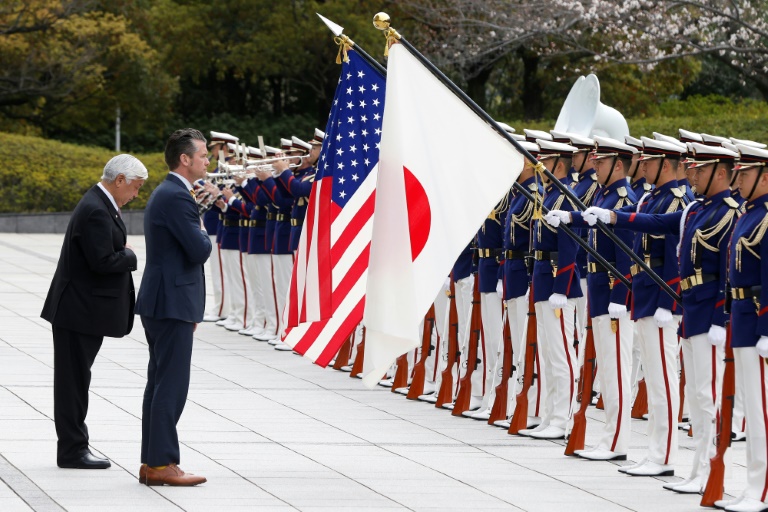(AFP) – Iran’s state media reported explosions in the central province of Isfahan on Friday, as US media quoted officials saying Israel had carried out retaliatory strikes against its arch-rival.
Israel had warned it would hit back after Iran fired hundreds of missiles and drones at Israel almost a week ago, in retaliation for a deadly strike — which Tehran blamed on its foe — that levelled Iran’s consular annex at its embassy in Syria.
Fears of a major regional spillover from the war in Gaza between Israel and Iran-backed Palestinian militants have since soared. Appeals by world leaders for de-escalation again echoed on Friday.
Air defence systems over several Iranian cities were activated, state media reported, after the country’s official broadcaster said explosions were heard near Isfahan city.
There had been no reaction from Israeli or Iranian officials, and the extent of the damage remained unclear.
An anonymous Israeli official told The Washington Post the strike was retaliation for Iran’s barrage and intended to signal that Israel had the ability to strike inside Iran.
Iran’s Tasnim news agency, citing “informed sources,” denied that Iran had been attacked from outside. “Contrary to the rumours and claims” made in foreign media, “there are no reports of an attack from abroad on Iran’s central city of Isfahan or any other part of the country,” Tasnim said.
Three Iranian officials told The New York Times that small drones carried out the attack, possibly launched from inside Iran, and that its radar systems had not detected unidentified aircraft entering Iranian airspace.
Fars news agency reported “three explosions” close to Qahjavarestan, near Isfahan airport and the 8th Shekari army airbase, while Iran’s space agency spokesman Hossein Dalirian said “several” drones had been “successfully shot down”.
Dalirian said on social media platform X there were “no reports of a missile attack”.
“Reports indicate there was no major damage or large explosions caused by the impact of any air threat,” the official IRNA news agency said.
– Nuclear sites undamaged –
The senior military officer in Isfahan, Brigadier General Siavash Mihandoost, told state TV that people had heard defence systems shooting at a target in the air, not an explosion on the ground.
Nuclear facilities in Isfahan were reported to be “completely secure”, Tasnim said, and the UN’s atomic watchdog confirmed “no damage” to Iran’s nuclear sites.
Washington received advance notice of Israel’s reported strike, but did not endorse the operation or play any part in its execution, US media quoted officials as saying.
US President Joe Biden had promised “ironclad” support for Israel but also urged it to “think carefully and strategically” before launching a response against Iran that could trigger a wider war.
There was no immediate comment from the White House, Pentagon or Israel’s military.
– Strikes in Syria –
Overnight last Saturday-Sunday Iran carried out its first-ever attack directly targeting Israel, its regional foe.
Israel, along with the United States and other allies, intercepted most of the more than 300 missiles and drones which Israel said Iran had launched. Minor damage and no deaths resulted.
Iran attacked in retaliation for the April 1 strike on its consulate in Damascus which killed seven of Iran’s Revolutionary Guards, including two generals.
Roxane Farmanfarmaian, a Middle East/North Africa specialist at the University of Cambridge’s POLIS department, has told AFP that Iran’s attack on Israel took the spotlight off Gaza, “and that was very much I think what Israel planned to do.”
Israeli Prime Minister Benjamin Netanyahu has been under international pressure over the civilian toll in Gaza’s war.
Domestically, protesters on Thursday night again called for his government to make a deal to bring home hostages held by Hamas.
Alongside the Gaza war, violence involving Iran-backed groups has soared throughout the Middle East.
Netanyahu, who has vowed to destroy Hamas over its October 7 attack that started the Gaza war, has stressed that Israel “reserves the right to protect itself” against Iran.
Washington, Israel’s main ally and military supplier, unveiled sanctions over Iran’s drone programme, as did the European Union.
After its strike on Israel, Iran had declared the matter concluded. But Iranian Foreign Minister Hossein Amir-Abdollahian warned that Tehran would make Israel “regret” any new attack on the Islamic republic.
China, Iran’s largest trade partner, on Friday said it will “continue to play a constructive role to de-escalate” tensions in the Middle East.
Italy, hosting a meeting of ministers from the G7 group of developed economies, called for de-escalation, as did European Commission chief Ursula von der Leyen.
British Prime Minister Rishi Sunak said he wants to see “calm heads prevail”.
Oman, which has long mediated between Tehran and the West, condemned an “Israeli attack” on Iran.
– Mideast ‘on a precipice’ –
Until its drone and missile attack, Iran and Israel had for years engaged in a shadow war, with Tehran accusing its adversary of sabotage attacks and assassinations targeting its nuclear programme, carried out alongside the United States.
In February last year Iran’s envoy to the United Nations blamed Israel for a drone attack on a defence ministry site in Isfahan, which is home to the Natanz nuclear enrichment facility.
Iran’s Nour news agency at the time blamed Iraq-based Kurdish groups of involvement and acting on the order of “a foreign security service.”
Also on Friday Israeli strikes hit southern Syria, Syria’s government and a monitor said. The defence ministry said the strike targeted air defence sites, while the British-based Syrian Observatory for Human Rights said the target was an army radar position.
UN Secretary-General Antonio Guterres had warned on Thursday that spiralling tensions could devolve into a “full-scale regional conflict.”
“The Middle East is on a precipice,” Guterres told the Security Council.
“One miscalculation, one miscommunication, one mistake, could lead to the unthinkable”, he said.
Friday’s events sent shivers through markets, with crude briefly surging as much as four percent, while equities tumbled. However, markets later eased back as Iran appeared to play down the matter.
burs-pjm-mz/it
© 2024 AFP




